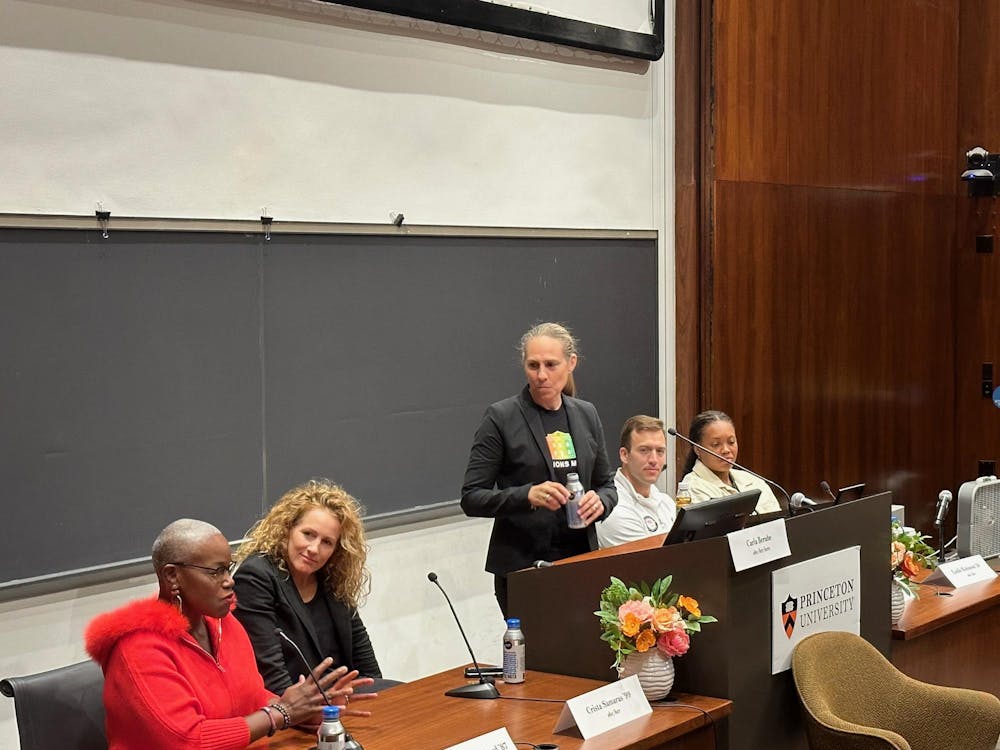At a panel on Saturday about athletics at Princeton, several speakers shared their experiences as LGBTQ+ athletes. The athletes suggested policy changes to enhance inclusivity, and discussed the place of transgender athletes in collegiate athletics.
“The Orange Bubble … it’s a hard place to exist in, and I don’t think anyone would deny that. So I think just having better, safer places for people to have those conversations would help everyone,” said Leslie Robinson ’18, who played on the Women’s Basketball team.
The panel, called “LGBTQ+ Narratives in Athletics at Princeton,” was part of the “Every Voice: Honoring and Celebrating Princeton’s LGBTQ+ Alumni,” a three-day event aimed at celebrating and honoring LGBTQ+ alumni. The Saturday panel aimed to “explore the historical evolution of Princeton student-athletes and the experiences of LGBTQ+ athletes across different decades” and to give “insights into progress in Athletics and recommendations for creating a more inclusive and diverse athletic community.”
The panel was moderated by head Women’s Basketball coach, Carla Berube. The featured alumni speakers were Robinson, Deborah Saint-Phard ’87, Women’s Shot Put, Mason Darrow ’17, Men’s Football, and Crista Samaras ’99, Women’s Lacrosse. Other speakers included John Mack ’00, Ford Family Director of Athletics and former Princeton track athlete, and Alayshja Bable ’26, a member of the Women’s Rugby team and president of the Queer Student-Athlete Collective (QSAC).
The conversation began with panelists discussing the personal navigation of their sexualities. Saint-Phard described the “pursuit of perfection” and desire to fit in at Princeton while reconciling her immigration from Haiti to a small town in Louisiana as a child. She said that Princeton’s “very white, affluent, heteronormative culture” environment intensified this desire.
“I needed a date for a house party, [and] I knew I needed to find a guy to go with,” Saint-Phard said, acknowledging she would be denying her sexuality in doing so.
Darrow and Robinson provided the audience with a perspective from more recent alumni. Darrow, who during his time in Princeton came out as the first openly gay Princeton football player, acknowledged that “the main challenge was a sort of lack of a visible gay community, especially among male athletes at the time.”
Like Saint-Phard, Darrow highlighted the pressures of expectations, saying, “Coming out, there was such a fear of ostracization.” He said he would worry to himself, “I can't be too gay, and I can't fit into this football team.”

“We are probably one of the most accepting teams on campus,” Robinson also said of the Women’s Basketball team.
“But the athletic department, no offense, has not always been that way, and so our coaches and all our teammates couldn't be who they wanted to be” she continued.
Audience member David Jackson ’87 voiced concerns about understaffing of Diversity Equity and Inclusion (DEI) personnel at Princeton. Questioning whether there were enough people to address existing issues, he asked, “Are we expecting that that one person's gonna have to solve its role in those things … Are you under-resourced to deal with changing demographics?”
In response, Mack emphasized that the changes to the Athletics department through work with DEI offices are department-wide.

“We have a staff of six sports psychologists who work with our student athletes. They did almost 1,000 individual consultations last year with student athletes talking about the intersection of their student-athlete identity with other identities,” he responded.
He then acknowledged the historical experiences of LGBTQ+ athletes at Princeton, saying, “While we can’t go back and change your experience, I hope that hearing the current experience that student athletes are having at Princeton is a subject of joy.”
After the speaker panel, during the question and answer portion of the session, one audience member asked about the environment for transgender athletes at Princeton.
Mack called the regulations around trans athletes in sports “the single most sensitive emotional issue in all of global sports.
“This is not a Princeton issue. This is not an NCAA issue” he explained. “This is a global issue, and you have to enter into the conversation with that in the back of your mind, because expecting answers is just unrealistic.”
“You have to have the right language and you have to have the right intent entering into the conversation regardless of what side of the conversation you want,” he continued.
“I feel torn on the topic because I believe that everyone, however they identify, should have a fair crack at competition,” Saint-Phard added. “I also get concerned about physiological form, forgive me, but I think it’s … physiological differences that give the trans athlete an advantage in a cisgender female world of athletics concerns me … in terms of vulnerability of the cisgender female athlete.”
Robinson offered a contrasting viewpoint: “[This] might not be a popular opinion, but everyone should be able to play. Michael Phelps is exceptional because of his wingspan. LeBron is exceptional because of his physique. No one is calling them out or telling them that they cannot play because … your YMCA local guy is just an average person.”
Ultimately, Robinson and the other panelists emphasized the importance of inclusion in sports at Princeton and beyond.
“The overarching story is just to let people come to you with who they are … I'm just very happy to see that [Princeton athlete alumni] can be who they wanted to be on campus and afterwards,” Robinson concluded.
Christopher Bao is an assistant News editor and the accessibility director for the ‘Prince.’ He is from Princeton, N.J. and typically covers town politics and life.
Jake Miller is a News contributor for the ‘Prince.’
Please send any corrections to corrections[at]dailyprincetonian.com.








